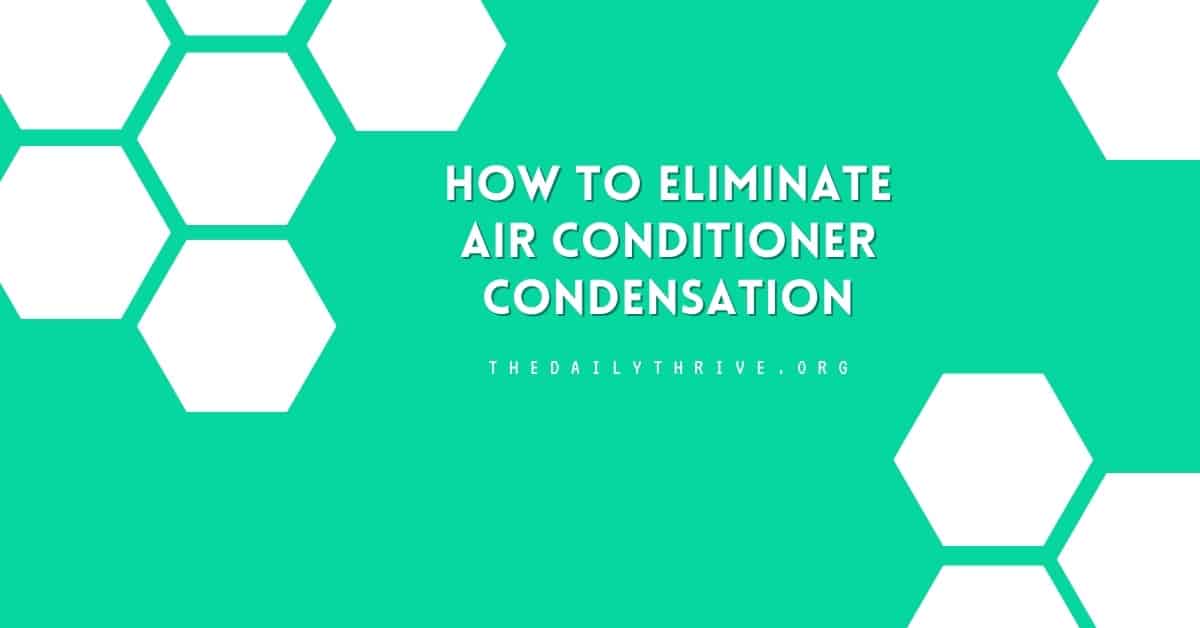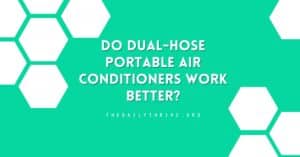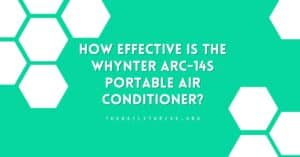Dealing with condensation in your air conditioning system can be perplexing. Yet, it’s a vital aspect of maintaining a comfortable and efficient home environment. This handy guide will walk you through understanding the nature of AC condensation, its causes, and effective strategies to prevent it.
Covering everything from the correct installation of condensation lines to routine maintenance tasks, this article is designed to help you keep your AC in top condition. Suitable for experienced homeowners and those new to home maintenance, these tips will enable you to effectively handle condensation issues, ensuring optimal air conditioner operation and a damage-free home.
Understanding Condensation in Air Conditioners
Condensation in air conditioners is a common and natural phenomenon, akin to the beads of water that form outside a cold beverage glass.
This occurs when the warm, moisture-laden air inside your home comes into contact with the cooler components of the air conditioning unit, such as the evaporator coil.
During the condensation process, the water vapor in the air condenses into liquid form. This transformation is a critical aspect of how air conditioners function, as it not only cools the air but also removes excess humidity, making indoor environments more comfortable.
How Much Condensation from AC Is Normal?
Determining the normal amount of condensation for an air conditioner depends largely on environmental factors. Generally, a certain level of condensation is to be expected and is entirely normal, particularly on hot and humid days.
These conditions cause more moisture in the air, leading to increased condensation as the air conditioner works to cool and dehumidify your home. It’s important to distinguish this normal process from potential problems.
Signs that the condensation may be excessive include water pooling around the unit, unusually high indoor humidity levels, or visible water dripping near the AC system.
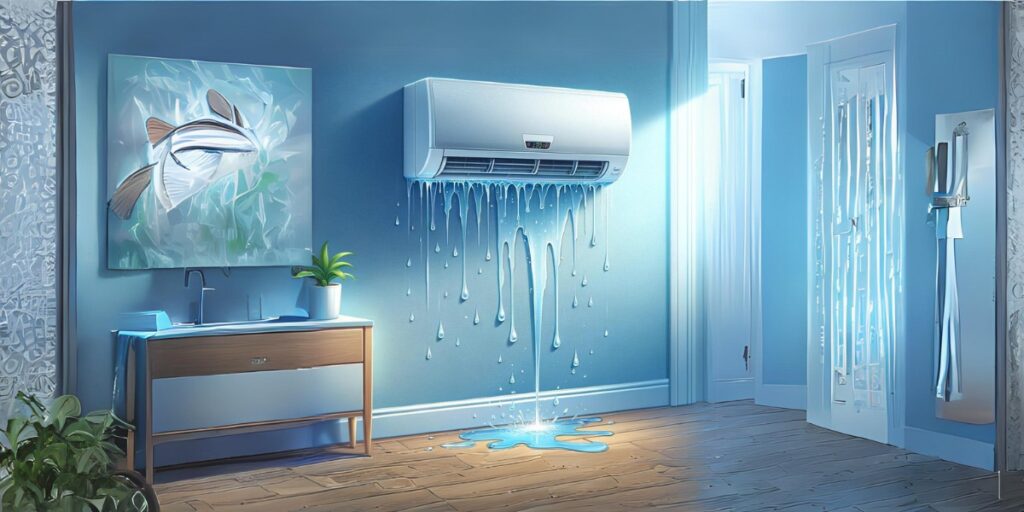
Air conditioner water dripping inside could indicate issues like a clogged drain line or malfunctioning condensate pump.
Is Condensation On Your Air Conditioning System Dangerous?
While some condensation is normal, excessive accumulation can lead to mold growth, water damage, and reduced efficiency, posing risks to the system and the home environment.
Here’s a deeper look into the potential dangers:
Water Damage to Your Property
Excessive condensation from your air conditioner can lead to serious water damage over time.
A continuous drip or leak, although it may seem minor, can create conditions ripe for mold and mildew growth, cause wood to rot, and lead to metal corrosion. This moisture can damage various parts of your home, such as peeling paint, ruined drywall, and, in severe cases, structural damage.
These issues compromise your home’s aesthetic appeal and can lead to costly repairs and maintenance.
Increased Humidity and Health Risks
An increase in condensation naturally leads to higher moisture levels in the air.
This elevated humidity creates the perfect environment for mold and mildew, which thrive in warm and moist conditions. Excess humidity can adversely affect the air quality in your home and potentially pose health risks to your family.
It’s important to be vigilant; signs of mold, such as black or brown spots around vents, should be addressed immediately. Since these molds are located around air vents, where air circulates constantly, it’s crucial to promptly remediate the issue to prevent further spread and potential health hazards.
Increased AC Repairs
Excess moisture in your AC unit can also spell trouble for the system. Water where it shouldn’t be can cause components within the air conditioner to corrode and degrade more quickly.
This shortens your AC unit’s lifespan and can lead to frequent and costly repairs. Additionally, a surplus of water can overwhelm the unit’s drainage system, potentially causing the entire system to malfunction or shut down.
It’s important to regularly maintain your AC system and address any unusual condensation promptly to prevent long-term damage.
What Causes Condensation on an Air Conditioning Unit?
The happening of condensation in an air conditioning unit is influenced by several factors, each contributing to potential excess moisture buildup. Understanding these causes is crucial for maintaining the efficiency and longevity of your AC system.
Factors contributing to condensation include:
Clogged Drain
A clogged AC drain is one of the most common issues leading to excessive condensation.
Over time, the condensate drain and line that carry water from the unit to the outside can become clogged with dust, dirt, mildew, and pet hair. This blockage prevents the proper flow of condensation, leading to overflow and potential water damage.
The drip pan that catches condensation from the evaporator coil is also susceptible to damage. It can crack or warp for various reasons, including freezing water buildup or corrosion in older metal pans. If the pan becomes misaligned, it could result in water pooling in incorrect areas and not draining properly.
Broken Condensate Pumps
In some setups, especially where the air conditioner is located in a basement, a condensate pump is essential for effectively removing water. These pumps rely on gravity to direct the condensation out of the system. If the pump is broken or malfunctioning, it can lead to condensation spilling around the unit.
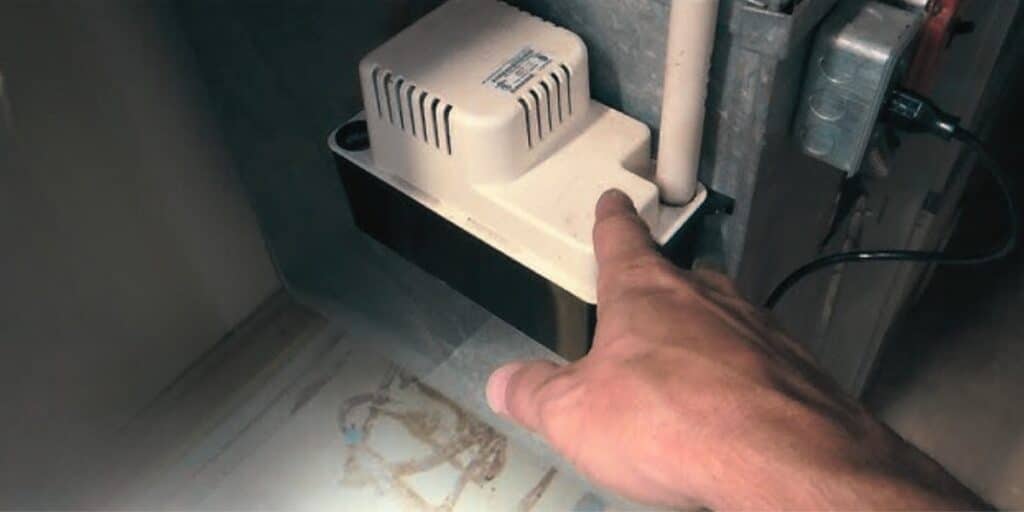
Signs of a faulty condensate pump include puddles around the system and cooling inefficiencies, particularly in basement installations.
Dirty Air Filter
A dirty air filter can have a more significant impact than many realize. When an air filter is clogged, it restricts airflow, leading to the evaporator coil freezing. When it eventually thaws, this frozen coil can overflow the drip pan as the ice melts. Regular cleaning and replacing the AC filter are vital to prevent this issue.
Low Refrigerant Levels
Low refrigerant levels, often due to leaks, can also contribute to condensation problems.
A refrigerant leak differs from standard condensation but is indirectly related. If the refrigerant line is cracked, the chemical (commonly referred to as Freon, though modern alternatives are now used) that cools the evaporator coil diminishes. This can lead to improper coil functioning, potentially causing excess condensation.
Handling refrigerant issues requires the expertise of a licensed HVAC professional, as it involves specialized knowledge and safety considerations.
“Incorrect installation of your AC system can also lead to serious issues. If components like the evaporator coils or drain lines are not properly installed, it can disrupt the normal flow of refrigerant fluid, leading to leaks and excess condensation.”
How Can You Prevent AC Condensation
Preventing condensation in your air conditioning system is crucial for maintaining efficiency and avoiding potential damage.
Here are effective strategies to stop and prevent AC condensation:
Ensure the Air Conditioner Line Is Installed Properly
Proper installation of the AC condensation line is vital for preventing excess moisture.
The line should run straight to ensure optimal drainage, with a slight drop of 1/8-inch for every 12 inches. If there are any 90-degree angle elbow connections, replacing them with 45-degree elbows can facilitate a smoother flow of condensate.
It’s often best to have an HVAC professional evaluate and address installation concerns to ensure your system is set up correctly.
Inspect Your Air Conditioner Line Regularly
Consistent inspection of your air conditioner line is a key preventive measure. A practical approach is to check the condensation line each time you change the HVAC air filter, usually once a month.
Look for any signs of moisture on the line and, during months of active AC use, ensure that water is appropriately flowing to the drain. The volume of water you see will vary depending on the humidity level in your home.
Additionally, an annual AC tune-up by a professional can identify and resolve potential issues early, extending the lifespan of your unit.
Keep Your Air Filters Clean
Maintaining clean HVAC filters is beneficial for reducing energy costs and crucial for preventing condensation.
Dirty filters restrict airflow, hampering the air conditioner’s cooling and dehumidifying functions. This can result in higher humidity levels inside your home, leading to condensation on air ducts.
Depending on the filter type and your living environment, cleaning or replacing the filter may be necessary monthly, every few months, or annually. Regular filter maintenance is a simple yet effective step in controlling humidity and preventing condensation in your AC system.
Properly Maintain Ductwork
Air conditioner ducts, much like air filters, can accumulate dust, debris, and other contaminants, leading to reduced airflow and subsequent condensation issues. While replacing air filters is a manageable DIY task, duct maintenance requires professional intervention. HVAC contractors possess the specialized equipment and expertise to thoroughly clean and maintain ductwork, ensuring optimal functioning and preventing condensation problems.
Managing condensation in your air conditioning system is crucial for maintaining a healthy, efficient, and well-preserved home environment. Understanding the causes of condensation and implementing effective measures to prevent it is important. You can maintain a cool, pleasant indoor environment without condensation-related issues by being vigilant and proactive in AC maintenance. While some maintenance tasks are suitable for DIY care, others may require a professional HVAC contractor’s expertise.
